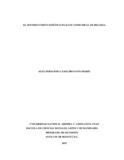Please use this identifier to cite or link to this item:
https://repository.unad.edu.co/handle/10596/30417Full metadata record
| DC Field | Value | Language |
|---|---|---|
| dc.contributor.advisor | Alvear Saravia, Adolfo Enrique | - |
| dc.coverage.spatial | cead_-_josé_acevedo_y_gómez | spa |
| dc.creator | Camacho Santamaría, Alex Fernando | - |
| dc.date.accessioned | 2019-12-14T14:09:50Z | - |
| dc.date.available | 2019-12-14T14:09:50Z | - |
| dc.date.created | 2019-12-12 | - |
| dc.identifier.uri | https://repository.unad.edu.co/handle/10596/30417 | - |
| dc.description.abstract | El objetivo de esta monografía es realizar un estudio de profundización sobre el sentido común estético que plantea Immanuel Kant en su obra la Crítica del juicio. Para Kant, el sentido común estético es la condición a priori de la facultad del conocimiento, a partir de la cual compaginamos el entendimiento y la moral con la experiencia en general, teniendo en el ideal de belleza el principio regulador de los juicios de tipo estético. Para la realización de esta investigación se dispuso de una metodología basada en realizar la lectura de la Crítica del juicio a la luz de las críticas u objeciones realizadas a la idea del sentido común estético allí expuesta. En este sentido, se recurre a los autores Laura Quintana y Lisímaco Parra, quienes enuncian una crítica al sentido común estético y a la Crítica del juicio desde una perspectiva empirista de la filosofía. Por último, se realiza un ejercicio de respuesta a las objeciones y criticas presentadas, y se formula a partir del debate una conclusión en la que se realiza una interpretación del sentido común estético kantiano, a partir de comprender su importancia dentro de la filosofía del autor alemán. | spa |
| dc.format | ||
| dc.title | El sentido común estético en Kant como ideal de belleza | |
| dc.type | Monografia | |
| dc.subject.keywords | Sentido común; Estética; Kant Empirismo; Belleza; Juicio | spa |
| dc.description.abstractenglish | The objective of this monograph is to conduct a study of deepening the common aesthetic sense that Immanuel Kant raises in his work the Critique of Judgment. For Kant, aesthetic common sense is the a priori condition of the faculty of knowledge, from which we combine understanding and morality with experience in general, having in the ideal of beauty the regulatory principle of aesthetic judgments. To carry out this research, a methodology based on reading the Critique of the Judgment was available in the light of the criticisms or objections made to the idea of aesthetic common sense there exposed. In this sense, the authors Laura Quintana and Lisímaco Parra are used, who enunciate a critique of aesthetic common sense and the Critique of the judgment from an empiricist perspective of philosophy. Finally, an exercise in response to the objections and criticisms presented is carried out, and a conclusion is formulated from the debate in which an interpretation of the Kantian aesthetic common sense is made, based on understanding its importance within the author's philosophy German. | spa |
| dc.subject.category | Estética | spa |
| dc.subject.category | Filosofía | spa |
| Appears in Collections: | Filosofía | |
Files in This Item:
| File | Description | Size | Format | |
|---|---|---|---|---|
| 91159100.pdf | 689.02 kB | Adobe PDF |  View/Open |
Items in DSpace are protected by copyright, with all rights reserved, unless otherwise indicated.
